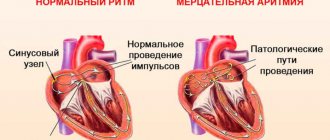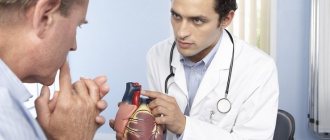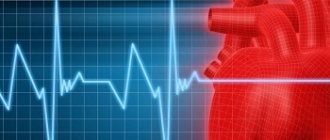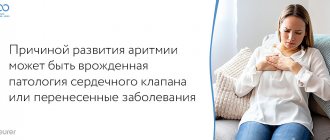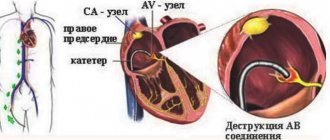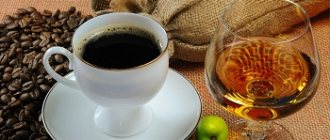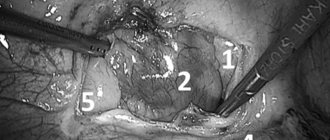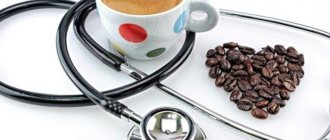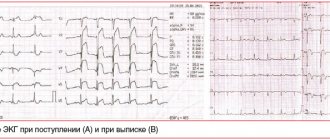IN SHORT SUMMARY : Watch your salt intake and don't be afraid to eat frozen foods.
Atrial fibrillation or atrial fibrillation is a heart rhythm disorder with frequent and chaotic excitation and contraction of the atria. The heart rate can reach 350-600 beats per minute, with the norm being 60-90 beats. With prolonged manifestation of atrial fibrillation (more than 2 days), the risk of blood clots and stroke increases.
Risk factors for such as age and genetics cannot be influenced. However, you can reduce its symptoms and the risk of cardiovascular diseases by changing your lifestyle, in particular, by reviewing your diet .
What diet to follow for atrial fibrillation?
There is no specially designed diet for patients with atrial fibrillation, but doctors suggest following the DASH diet , which is recommended for the prevention of heart disease and reducing the risk of heart attacks and strokes.
The heart-healthy DASH (Dietary Approaches to Stop Hypertension) diet consists of fruits, vegetables, whole grains, fish and poultry, and low-fat dairy products.
Examples of DASH diet menus: here and here.
A study published in Medicine in 2021 found that strict adherence to the DASH diet was associated with a reduced risk of stroke . And this is good news, since the relationship between atrial fibrillation and stroke has been established .
Authorized Products
A nutritious, fortified diet for this heart disease significantly reduces the risk of complications.
Useful products include:
- fruits with a high content of vitamins and microelements: currants, raspberries, cherries, apples, oranges, bananas, pears, plums, lingonberries, etc.;
- vegetables: red pepper, tomatoes, cabbage, beans, cucumber, pumpkin, potatoes, beets;
- Honey is recommended for daily use;
- boiled meat (rabbit, veal, turkey, chicken breast), fish (steamed or boiled);
- any seafood;
- low-fat cottage cheese, yoghurts, milk, kefir.
It is also worth noting products that are especially recommended for this diagnosis:
- broccoli - cabbage with a huge content of vitamin C, B, D, potassium, magnesium, iron, phosphorus, manganese and fiber;
- Avocado is a source of vitamins E, B6, B2 and C, copper, iron, enzymes that prevent the development of anemia and promote the absorption of heart-healthy substances;
- rosemary – strengthens blood vessels;
- parsley – necessary for arrhythmia, as a diuretic;
- grapefruit – contains glycosides, vitamins C, D, P, B1, plant fiber, which helps improve heart function and normalize metabolic processes.
As you can see, you definitely won’t have to sit from hand to mouth. Nature has prepared many products that can protect and strengthen the heart, all that remains is to take advantage of its gifts.
What's not allowed?
Caffeine . Caffeine is contraindicated for most patients with atrial fibrillation. It speeds up your heart rate and may worsen symptoms. If you can't give up coffee and tea, there's good news: a 2021 study that examined the relationship between arrhythmia and caffeine found that it's safe to consume up to 300 mg of the substance per day. However, it is best to discuss this issue with your doctor.
Salt . It is very important to limit it, since salt abuse can lead to increased blood pressure, which, in turn, increases the risk of atrial fibrillation. The foods most of us are accustomed to contain too much salt. Avoiding processed foods and processed foods and replacing salt with seasonings is a smart nutrition strategy for everyone, especially those with heart disease.
What foods should you avoid? An infographic from the American Heart Association will tell you.
The effect of coffee on heart rate
Caffeine relaxes the walls of blood vessels, which increases blood flow and improves oxygen supply to the heart. At the same time, the alkaloid acts on the adrenal glands, which begin increased production of adrenaline. For this reason, coffee increases blood pressure and increases heart rate. The processes do not occur so clearly that a healthy person can feel them. This kind of exercise even strengthens blood vessels and is good for the heart.
Tachycardia is characterized by a persistent increase in heart rate above 90 beats per minute. The unpleasant consequences of the disease are disruption of the normal supply of oxygen to the heart and the risk of developing ischemia, leading to heart attacks.
If previously cardiologists were categorically against drinking coffee for tachycardia, now the opinion of doctors is gradually changing. Numerous studies show that drinking coffee in acceptable doses does not have a negative effect on the cardiovascular system. Coffee increases the pulse slightly, but the heart rate quickly returns to normal.
What is possible?
Frozen fruits and vegetables . They are even preferable to fresh ones, although it was previously believed that some nutrients and vitamins were lost when frozen. This is wrong. Fruits and vegetables that are frozen are harvested when fully ripe and using the most modern methods (for example, blast freezing), trying to preserve their nutritional value as much as possible. But during transportation to stores, which can take from several days to weeks, fresh vegetables and fruits lose their beneficial properties. In addition, they are harvested before they are fully ripe, which means they inherently contain fewer nutrients and vitamins.
Liquid . It is important for patients with atrial fibrillation to know that dehydration worsens symptoms. It is necessary to drink enough water and other liquids throughout the day, include foods containing potassium and magnesium - fruits, vegetables, fish, whole grains, beans, nuts, green leafy vegetables (but not dietary supplements).
Heart arythmy
What is cardiac arrhythmia?
Arrhythmia is a disorder of the heart rhythm. The main reasons causing the failure are:
- intoxication of the body as a result of drinking alcohol, drugs and smoking;
- stress;
- vasoconstriction;
- lack of hemoglobin in the blood;
- strong adrenaline rush;
- electrolyte imbalance;
- heart disease (heart failure, heart attack, heart muscle defect);
- hormonal imbalance;
- physical and mental exhaustion.
The main causes of heart rhythm disturbances include:
- Congenital or acquired heart defect.
- A person has chronic heart failure.
- Cardiac ischemia.
- Hereditary cardiomyopathy.
- Hypertonic disease.
Symptoms of arrhythmia
The main symptoms of arrhythmia are: 1. Tachycardia. This is a rapid heartbeat (above 90 beats per minute). 2. Bradycardia. Decreased heart rate (less than 50 beats). 3. Extrasystole. Irrhythmic heartbeat (untimely contraction of the heart chambers). 4. Atrial fibrillation. A type of tachycardia manifested by atrial fibrillation. 5. AV block. A type of bradycardia characterized by a disturbance in the conduction of impulses from the atria to the ventricles.
Prevention of cardiac arrhythmia should be carried out only after consultation with a doctor, who will accurately determine whether there is a malfunction in the rhythm of the heart muscle and what caused it.
When arrhythmia occurs, a person's heart rate changes. Rhythm disturbances are quite rarely an independent disease. In most cases, arrhythmia signals the presence of various heart diseases in a person.
When talking about cardiac arrhythmia, it is important to remember the danger of this disease. And the best solution would be timely prevention of cardiac arrhythmia. It is very important to take this measure seriously, since about 35–40% of sudden deaths occur due to asymptomatic cardiac arrhythmia. Prevention of a disease such as cardiac arrhythmia must begin with the treatment of cardiovascular diseases. After all, heart rhythm disorder often begins precisely because of more serious illnesses. When starting a course of treatment, it is important to give up bad habits (alcohol) forever.
Cardiac arrhythmia is not a death sentence, but a disease that is a violation of the frequency, sequence and rhythm of heart contractions. The disease can be determined only after examination using an ECG device and ultrasound examination of the heart.
Causes of arrhythmia. Provocateurs of the disease for completely healthy people can be excessive consumption of food, tight clothing, medications, constipation, insect bites, and stressful situations. For people with diabetes, overweight and high blood pressure, the risk of heart arrhythmia increases.
Symptoms of arrhythmia. As a rule, heart arrhythmia disease corresponds to the following symptoms: slow, or vice versa, too fast heartbeat; missed or extra heart beats; frequent fatigue, a state of weakness of the body, shortness of breath, pain in the heart.
Folk remedies for the treatment of arrhythmia. Cardiologists do not recommend using traditional medicine advice for arrhythmia. Why? Do not forget that arrhythmia is a disease of the heart, an organ vital to humans. It is necessary to quickly make a correct diagnosis and prescribe competent treatment. Folk remedies for arrhythmia, as medical practice shows, are powerless.
Prevention of arrhythmia. To reduce the likelihood of developing arrhythmia, try to maintain an active lifestyle: engage in recreational and therapeutic exercise, take walks in the fresh air, and try not to overwork yourself with work. Prevention of arrhythmia is also a timely visit to the doctor. As soon as you feel the first signs of the disease, or you simply have suspicions, contact a medical facility.
Treatment of arrhythmia. Treatment of arrhythmia is carried out in conjunction with antiarrhythmic procedures. It is worth remembering that there are a large number of types of arrhythmia. The type of treatment, the use of various drugs and procedures depends on the type of disease.
Most importantly, do not despair and be pessimistic about treatment. Arrhythmia is cured. You just need to follow the doctor’s recommendations, take medications on time, and devote more time to physical activity.
Sports to prevent arrhythmia
A person does not need to exhaust himself with unbearable physical activity. You can go swimming or jog for short distances. When skiing or performing simple gymnastic exercises, the condition of the cardiovascular system noticeably improves.
You can do simple physical exercises such as push-ups or squats. Squats help improve vascular tone and activate blood circulation in the body. The main rule is that when performing the exercise you need to keep your back straight.
The body must adapt to physical activity. Over time, a person will be able to move on to more complex exercises.
Maintaining a balanced diet
If you have heart rhythm disturbances, reconsider your diet. Eliminate fats and foods that are too salty, smoked, or spicy from your food. Give preference to fresh vegetables, fruits, and whole grain cereals. In the diet, pride of place is given to products containing vitamins and microelements necessary for the heart muscle. A person should give preference to products containing potassium and magnesium. These beneficial microelements have a beneficial effect on the cardiovascular system.
The heart needs potassium, magnesium, zinc, and calcium to properly pump blood. A large amount of potassium is found in bananas, sunflower seeds, and potatoes baked in their jackets.
Dairy and fermented milk products are considered a source of calcium. It is useful to include in your diet sesame seeds, rich in zinc, buckwheat porridge, legumes, various nuts, currants, beets baked in the oven, and corn. All these products have a positive effect on the functioning of the heart muscle. The body's need for magnesium and potassium increases under the influence of various factors. These include: hard physical work, overwork, stress, increased sweating, mental overstrain.
Foods rich in potassium and magnesium are listed in table No. 1
| Foods high in potassium | Magnesium Rich Foods |
| Potato | Cocoa |
| Cabbage | Bran |
| Carrot | Sesame seeds |
| Bananas | Shrimps |
| Dried apricots | Nuts |
| Raisin | Peas |
| Prunes | Sea kale |
| Dates | Beans |
| A person's diet should consist of vegetables, fruits and whole grains. Overeating should be avoided. | |
A person who is predisposed to arrhythmia should also give up alcoholic beverages. They contribute to a sharp contraction of blood vessels: this negatively affects the functioning of the cardiovascular system.
Drugs for the prevention of cardiac arrhythmia
Folk remedies and changing eating habits help normalize heart rhythm. If heart rhythm disturbances are associated with mental causes or depressive states, then sedatives are prescribed for treatment. For preventive purposes, products can be purchased without a doctor's prescription.
Amiodarone
Helps quickly relieve an attack of arrhythmia and is suitable as maintenance therapy to prevent heart rhythm disturbances. Indicated for atrial flutter, atrial fibrillation, and sinus tachycardia. The drug is indicated for severe arrhythmia in combination with heart failure and coronary heart disease. The drug is contraindicated for arrhythmia in combination with atrioventricular block. Patients tolerate the medicine well, side effects are rare. Amiodarone is used for prophylaxis at 200–400 mg per day, dividing this dose into 3 doses. The course lasts 7–14 days.
Quinidine
The membrane stabilizing drug is intended for the prevention of atrial fibrillation and ventricular fibrillation. Lowers blood pressure, weakens myocardial function. The daily dose of the drug is 3 grams. It is divided into 4–5 doses. The drug is not used in cases of quinine intolerance, or in combination with Verapamil and anticoagulants.
Procainamide
Take the drug to prevent arrhythmia at 250–500 mg several times a day (the maximum daily dose is 4 grams). Contraindicated in bronchial asthma, severe disorders of the kidneys, liver, atherosclerosis and after myocardial infarction.
Ibutilide Sotalol
Beta blocker. Suitable for the prevention of tachyarrhythmia. The daily dose is 80 grams. The drug has a low distribution in tissues and organs, therefore it is suitable for the prevention of arrhythmia in patients with liver and kidney diseases.
Verapamil
Prevention of atrial fibrillation is often carried out with the use of this drug. Take it several times a day with meals. The prophylactic dose is 48 mg. Do not use the drug with other antiarrhythmic drugs, in the presence of hypotension, heart failure in the stage of decompensation.
Panangin
It is used to prevent arrhythmia, including those caused by an overdose of cardiac glycosides as a means of replenishing the deficiency of potassium and magnesium. Prescribe 1-2 tablets 3 times a day. The preventive course is 3–4 weeks. Contraindications include pregnancy and lactation, low blood pressure, and dehydration.
Anaprilin
A popular antiarrhythmic adrenergic blocker, which contains propranolol. A single dose of the product should not exceed 80 grams. Take the drug twice a day. Contraindications to taking the drug are bradycardia, chronic heart failure, intolerance to propranolol.
Metoprolol
A beta blocker, which is prescribed for the prevention of arrhythmia, coronary heart disease, and high blood pressure. For prevention, it is recommended to take 1 tablet twice a day. Contraindications are: bradycardia, persistent hypertension, angina pectoris, age under 18 years, period of pregnancy and lactation. Treatment of atrial fibrillation should be carried out only under the guidance of a doctor, since this condition seriously threatens the patient’s life. For prevention, take various heart medications in a therapeutic dose to maintain normal heart muscle function.
Watch your calories
Maintaining a healthy weight is important to reduce symptoms of atrial fibrillation. Move more, count calories, eliminate sweets, baked goods, fatty and processed foods from your diet. Discuss your meal plan with a nutritionist, and use smartphone apps that help you count calories and determine the amount of calories and nutrients in foods (Lose It!, Fooducate, MyFitnessPal). They can be downloaded from the App Store and Google Play.
Join us on social networks!
Subscribe to Telegram!
Contraindications to diets for men and women
Dietary nutrition is recommended for all patients without exception, but there are precautions for certain categories. Children and adolescents should not use low-fat, low-protein diets because they can cause slow growth and hormonal imbalances. If it is necessary to reduce the caloric content of the diet, you need to control the intake of simple carbohydrates (sugar and flour), carbonated sweet drinks and fast food.
For pregnant and lactating women, strict diets are also not used, and the content of essential nutrients should be balanced. A healthy diet necessarily includes lean fish and meat, boiled and fresh vegetables, bread and whole grain cereals, dairy products, berries and fruits.
Diet for diabetics is no less important than medications. For them, any food other than treatment table No. 9 is unacceptable. Only an endocrinologist can make changes to it. If the diet is violated, the content of glucose, ketone bodies, and acid-base balance in the blood can change dramatically. The consequences of this are extremely dangerous - coma and even death.
If there are concomitant dysfunctions of the digestive organs or kidneys, it is necessary to take into account the peculiarities of constructing a menu for these diseases. In such cases, it is best to seek help from a nutritionist.
Menu for the week
When planning a diet, the diet should be developed in conjunction with a professional nutritionist. Below is a sample menu for the week:
Monday
- For breakfast – milk buckwheat porridge, grape juice.
- Lunch – vegetable soup, rye bread.
- Dinner – boiled chicken with a side dish of rice and vegetables.
- Before going to bed, it is recommended to drink fermented baked milk (200 ml).
Tuesday
- Breakfast – a bread sandwich with jam, tea with lemon balm.
- Lunch – chicken cooked in the oven, vegetable salad, black bread.
- Dinner – potatoes with boiled vegetables.
- Before bed – rosehip decoction (250 ml).
Wednesday
- Breakfast – fruit salad with yogurt.
- Lunch – pasta with mild tomato sauce and sesame seeds, juice from a mixture of apple and grapes.
- Dinner – turkey and side dish of corn.
- Before bed - yogurt.
Thursday
- Proper nutrition of a patient with heart failure and edema
- Breakfast – cereal flakes with yogurt.
- Lunch – sea fish with mashed potatoes, dried apricot compote.
- Dinner – vegetable stew with rice side dish.
- Finish the day with a glass of herbal tea.
Friday
- Breakfast – feta cheese (unsalted), grain bread, compote.
- Lunch – salmon fish with vegetable side dish.
- Dinner – vegetable cutlets, herbal tea.
- Before lights out - yogurt.
Saturday
- Breakfast – oatmeal with nuts and dried fruits.
- Lunch – baked salmon slices with a side dish of sprouted wheat grains.
- Dinner – cottage cheese casserole, topped with sour cream.
- Before bed - kefir.
Interesting article: Table 10 diet for cardiovascular diseases
Sunday
- Breakfast – wheat porridge with milk, freshly squeezed orange juice.
- Lunch – mackerel with potato side dish, rye bread.
- Dinner – casserole topped with sour cream.
- You can end the day by drinking a glass of kefir.
The above menu illustrates the principle approach to dietary nutrition. Herbal tea plays an important therapeutic and preventive role. Sugar and salt should be limited as much as possible.
How many cups of coffee can you drink in a day if you have arrhythmia?
The main thing in everything is moderation. A whole liter of this drink can disrupt the heart rhythm even in a healthy person. If you drink 2-3 cups of coffee a day, then nothing bad will happen to you. But this measure is an average. Each person has an individual reaction to this drink. Some people tolerate the effects of caffeine and other components of natural coffee very well, while others feel ill after a couple of sips. The standards for coffee and other drinks are as follows:
- healthy person – up to 400 mg of caffeine;
- pregnant woman - 300 mg of caffeine.
This norm is daily, i.e. You can drink no more than 4-5 glasses of this drink in 24 hours. Do not forget that caffeine is included in various teas, so they also need to be added.
Diet No. 10 - do's and don'ts
| Can | It is forbidden |
| Dietary salt-free bread, toast, white bread croutons | Fresh bread, pancakes, pancakes, baked goods |
| Vegetable soups with cereals, milk soups | Broths from meat, poultry, fish, mushrooms. Soups with legumes |
| Lean beef, veal, rabbit, chicken, turkey. Boiled or baked without fat | Fatty meat, geese, ducks, offal, sausages, smoked meats, lard and corned beef, canned meat |
| Lean fish and seafood - boiled or steamed | Fatty fish, salted, smoked fish, caviar, canned fish |
| Milk, low-fat cottage cheese, yogurt, kefir | Salty and fatty cheese, sour cream, cream |
| Soft-boiled eggs, omelettes. No more than 1 egg per day | Fried eggs, hard-boiled eggs |
| Cereal dishes, pasta made from durum flour | Legumes |
| Boiled and baked vegetables. Raw vegetables rarely and carefully | Pickled, salted vegetables. Radishes, onions, garlic, mushrooms, radishes, green peas, cabbage |
| Fresh ripe fruits and berries, honey, jam, dried fruits | Fiber fruits, chocolate, cakes |
| Weak tea, fruit and vegetable juices | Natural coffee, cocoa, strong tea, alcohol |
| Vegetable oils, occasionally unsalted butter | Cooking fats and margarines, lard |
Tags:
- Heart and blood vessels
- Diets
- Caffeine
- Nervous system
- Cellulose
- Therapeutic diets
• To leave a comment you must be an authorized user
- RashaDi In a word - all natural. It’s precisely in semi-finished and processed foods that there is a huge amount of cholesterol and trans fats that accumulate in the body, increase fat deposits, and negatively affect the functioning of the cardiovascular system. I order Atheroclefit Bio on the website phytomarket.ru and take it as a course. The composition is natural, for example, dioscorea extract, supports the health of blood vessels, cleanses their walls of bad cholesterol.
- senezh _Bu__, only your attending physician can advise you on diet and measures to treat your bradycardia. We will not advise you anything here in absentia.
- _Bu__ Question to the specialists representing the site - on “Diet No. 10 - do’s and don’ts”: 1. Why can’t fresh vegetables be allowed? - it would seem that everyone knows that this is healthy food, take it and eat as much as you like. 2. In the same place - why not legumes, mushroom broths, fatty fish, fish broths? (does this refer to ear by the way?) 3. How hard to toast regular black rye bread to make toast in a standard toaster? (minute scale-roller) 4. What is the diet and necessary measures for blood pressure 114\64, pulse 64-69? Bradycardia?
- helluva why can’t legumes and fruits with coarse fiber?
- lastmac without salt our body will die, we need salt
- BUKA_ I’ve been on this diet for about 2 weeks... I'm used to eating without salt... =)
- I liked Colorized 5 basic principles, they are generally doable. But diet No. 10 is very strict, I will start following this if something really hurts, but it’s unlikely to be used as a preventive measure. I’m not yet ready to give up raw vegetables, chicken soup, onions, mushrooms, cheese, beans, salmon.
Healthy foods for the heart
Experts have compiled the following rating of foods that are beneficial for the heart muscle:
- Products enriched with vitamin E - cheese, cottage cheese, legumes.
- Natural grape juice. The most effective product is obtained from red grape varieties. It is recommended to drink 200-250 ml daily.
- Low fat milk. Fresh milk is especially useful. The recommended daily intake is 300-400 ml.
- Sea fish. The omega-3 fatty acid it contains has a beneficial effect. Particularly notable are: mackerel, herring, cod, salmon.
- Nuts. Walnuts have proven to be excellent, and should be eaten 5-6 times a day.
Interesting article: Effective diet for hypertensive patients with heart and vascular diseases
- Diet for blood type 2 negative: food table and diet
